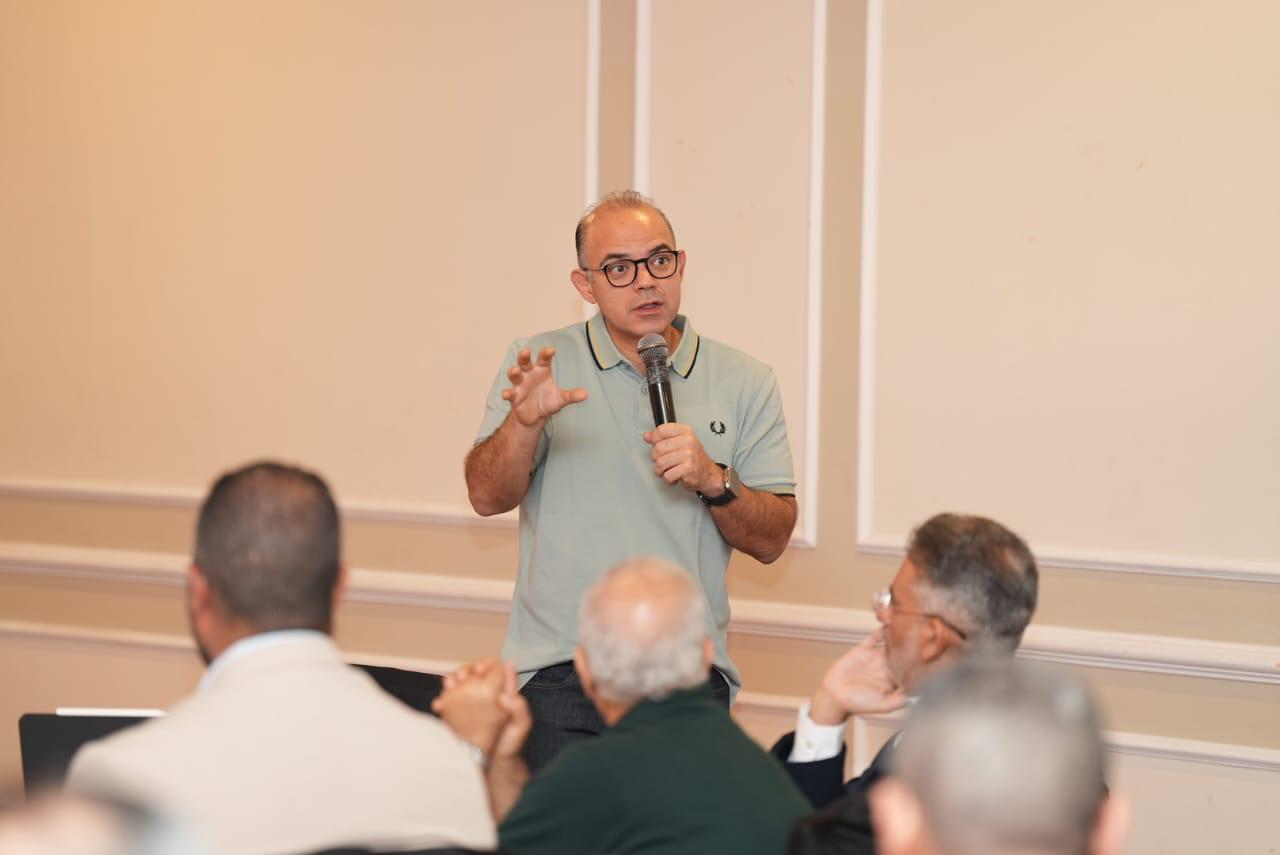- An extensive session spotlighted financial derivatives, emphasizing their critical role in driving market development, stability and competitiveness.
- The session emphasized the core benefits of derivatives, including hedging against price fluctuations and financial leverage, offering a lower cost of trading compared to alternative investment methods.
- The Authority provides continuous training programs and raising the efficiency of traders to support robust economic growth and attract further investment.
The Authority hosted a two-day training workshop for journalists, recognizing their vital role in raising awareness of the non-banking financial sector specifically capital market, insurance and non-banking finance.
The event featured a series of interactive sessions focused on regulating and developing these activities. Dr. Mohamed Farid, FRA Chairman and senior heads participated alongside the journalists.
The initial session focused on financial derivatives, providing an in-depth look at the derivatives market’s nature and definition. This aligns with the Authority’s commitment to build a more stable and competitive capital market. The discussion differentiated between key derivative types, including forwards, futures, options and swaps, emphasizing their significant value as a new addition to the Egyptian capital market.
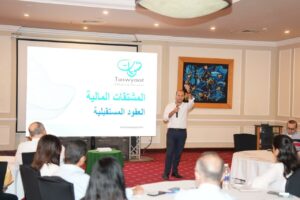
The session underscored the importance of derivatives as key instruments, providing indispensable opportunities for risk hedging and enhancing overall market efficiency.
These instruments were detailed individually for clarity. Forwards Contracts represent customized agreements to buy or sell an asset at a set future date and price, typically concluded directly between financial institutions without exchange trading. Futures Contracts, in contrast, are standardized contracts to buy or sell approved assets, executed later at a set price but with uniform specifications for quality and delivery.
On the other hand, Options Contracts grant the buyer the right, but not the obligation, to transact an asset at an agreed-upon price within a specific timeframe. Finally, Swap Contracts involve the exchange of financial obligations, such as interest or future cash flows, under predefined conditions, including swap rate, payment dates and contract maturity date. Collectively, these tools form an integrated unit that supports the development of non-banking financial markets, enhances their capacity for risk management and diversifies available investment options.
Derivatives offer investors several key advantages. Primarily, they provide the potential for profit based on contract price movements: buyers gain when asset prices rise, and sellers benefit when prices fall. More significantly, derivatives serve as an effective means of hedging against risk. For instance, investors who own assets can use futures contracts to mitigate the impact of price volatility; gains made from taking a short (selling) position in futures can directly offset any losses resulting from a decline in the value of their underlying physical assets.
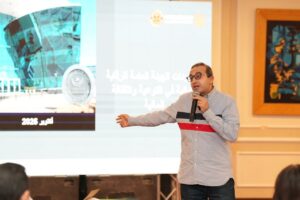
These instruments are also distinguished by providing financial leverage which enables the investor to execute large transactions by depositing a small initial margin. This offers the potential to achieve high profits in exchange for limited investment, despite the associated potential risks that can also magnify losses. Derivatives also contribute to efficient portfolio management by either increasing or decreasing a portfolio’s exposure to market fluctuations without needing to change the underlying assets. Furthermore, derivatives trading is characterized by lower costs compared to other investment methods which enhances their attractiveness as a supportive tool for developing and diversifying non-banking financial markets.
The second session addressed Market Maker, Liquidity Provider and Authorized Participants (APs). The Market Maker activity aims to provide permanent liquidity for a security or financial instrument listed on one of the financial exchanges for which they are committed to making a market. This is achieved by continuously guaranteeing the possibility of trading the instrument through the entry of buy and sell orders throughout the trading sessions, in accordance with the regulations issued by the Authority.
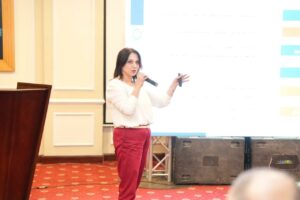
The Liquidity Provider plays a crucial role in the market by enhancing the liquidity and ensuring the stability of a listed security or financial instrument. They achieve this by continuously entering buy and sell orders during trading sessions, operating under an agreement with the asset’s issuer and adhering to the Authority’s regulations. On the other hand, the Authorized Participants (APs) have the right to create and redeem shares of an exchange-traded fund (ETF) including index or commodity funds. Their primary goal is to maintain a high correlation between the market price movements of the ETF units and the fund’s Net Asset Value (NAV). This function is carried out through a contract with the respective investment fund, subject to the Authority’s established rules.
The session also covered the mechanism of borrowing securities for selling, commonly known as short selling. This mechanism involves a brokerage firm borrowing securities owned by a third-party lender on behalf of a borrowing client. The transaction is facilitated through the central securities lending system at the MCDR. The core purpose is to sell the borrowed securities immediately and then buy them back to return to the lender at a later date, all based on pre-agreed terms regarding quantity, period and the lending rate of return.
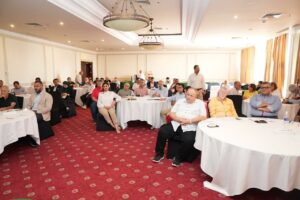
Short Selling mechanism also facilitates lending directly through the Custodian. Under an agreement with a lending client, the Custodian can offer the client’s owned securities to other parties via the central system. The owner of the securities determines the return they receive for lending them. Importantly, the availability of this mechanism is restricted only to securities that have been specified by the Exchange and subsequently approved by the Authority.
Finally, FRA continues to dedicate significant effort to build a more developed and deep non-banking financial market. This commitment is realized by enhancing the knowledge and efficiency of both traders and media professionals which in turn ensures the Authority’s goals are communicated to the public clearly and accurately. FRA confirms that it will continue organizing training programs and events to support market development, boost the transparency and efficiency of non-banking financial activities, align with best international practices, and ultimately serve national plans to stimulate investment and accelerate economic growth.
وأوضحت الجلسة أن الأدوات المالية المُشتقة تُعد من بين أهم الآليات المستخدمة في الأسواق المالية، لما تتيحه من فرص للتحوط وإدارة المخاطر وتعزيز كفاءة التداول. وتشمل هذه الأدوات العقود الآجلة التي تمثل اتفاقًا لشراء أو بيع أصل في وقت مستقبلي محدد وبسعر متفق عليه مسبقًا، ويتم إبرام هذا النوع من العقود غالبًا بين مؤسسات مالية أو بينها وبين عملائها دون تداولها في البورصات. كما تندرج العقود المستقبلية ضمن هذه الأدوات، وهي عقود نمطية لشراء، أو بيع سلع، أو أوراق مالية، أو غيرها من الأدوات المالية المعتمدة، ويجري تنفيذها في موعد لاحق وفق سعر تنفيذ يتم تحديده عند إبرام العقد، مع توحيد مواصفات السلع المتعاقد عليها من حيث الجودة والكمية ومكان التسليم.
وتتضمن الأدوات المالية المشتقة أيضًا عقود الخيارات التي تمنح مشتري العقد الحق دون الالتزام في شراء أو بيع كمية محددة من السلع أو الأوراق المالية أو غيرها من الأدوات المالية، وذلك خلال فترة زمنية أو في تاريخ محدد وبسعر يُتفق عليه عند إبرام العقد. كما تشمل عقود المبادلة التي تقوم على مبادلة التزامات مالية كالفائدة أو التدفقات النقدية المستقبلية، وفقًا لشروط تُحدد مسبقُا عند توقيع العقد، بما في ذلك سعر المبادلة وتواريخ التبادل ونهاية مدة العقد. وتأتي تلك العقود كوحدة متكاملة تعمل على دعم تطور الأسواق المالية غير المصرفية وتعزيز دورها في إدارة المخاطر وتنويع الأدوات الاستثمارية المتاحة.
وتسهم الأدوات المالية المشتقة في توفير مزايا متعددة للمستثمرين، حيث تتيح إمكانية تحقيق أرباح اعتمادًا على التحركات السعرية للعقود، فمشتري العقد يحقق مكاسب عند ارتفاع الأسعار، بينما يستفيد بائع العقد عند انخفاض قيمته. كما تمثل وسيلة فعّالة للتحوط من المخاطر، إذ يلجأ المستثمر مالك الأصول إلى استخدام العقود المستقبلية لتقليل تأثير تقلبات الأسعار، حيث تعوّض المكاسب المحققة من مراكز البيع في العقود المستقبلية أي خسائر قد تنجم عن تراجع قيمة الأصول الأساسية.
وتتميّز هذه الأدوات أيضًا بتوفير الرافعة المالية التي تمكّن المستثمر من تنفيذ صفقات كبيرة عبر إيداع هامش مبدئي بسيط، مع إمكانية تحقيق أرباح مرتفعة مقابل استثمار محدود، رغم ما يرتبط بذلك من مخاطر محتملة على نحو يضاعف حجم الخسائر. كما تساهم المشتقات المالية في إدارة المحافظ الاستثمارية بكفاءة من خلال تعزيز أو تقليل تأثر المحفظة بتقلبات السوق دون الحاجة إلى تغيير الأصول المكوّنة للمحفظة. إضافة إلى ذلك، تتميز تداولات المشتقات بانخفاض تكلفتها مقارنة بوسائل الاستثمار الأخرى، مما يعزز من جاذبيتها كأداة داعمة لتطوير وتنويع الأسواق المالية غير المصرفية.
وتطرقت الجلسة الثانية إلى صانع السوق وموفر السيولة ونشاط المفوض المعتمد. يقصد بنشاط صانع السوق توفير سيولة دائمة للورقة أو الأداة المالية المقيدة بإحدى بورصات الأوراق والأدوات المالية، والتي يلتزم بصناعة سوقها، وذلك عبر ضمان إمكانية التداول عليها من خلال إدراج أوامر شراء وبيع بشكل مستمر خلال جلسات التداول، وفقًا للضوابط الصادرة عن الهيئة.
ويقصد بنشاط موفر السيولة العمل على تعزيز مستوى سيولة الورقة أو الأداة المالية المقيدة بإحدى بورصات الأوراق والأدوات المالية وضمان استقرار سوقها، وذلك عبر إدراج أوامر شراء وبيع خلال جلسات التداول بناءً على اتفاق مع مصدر الورقة أو الأداة المالية، وبما يتوافق مع متطلبات الهيئة. كما يقصد بنشاط المفوض المعتمد القيام بإصدار أو استرداد وثائق الصناديق المتداولة، بما في ذلك صناديق المؤشرات أو السلع المتداولة، بهدف الحفاظ على معامل ارتباط تحركات أسعار الوثائق مع صافي قيمة أصول الصندوق، ويتم ذلك من خلال التعاقد مع صندوق الاستثمار المعني، ووفقًا لما تقره الهيئة من قواعد وضوابط.
وسلّطت الجلسة الضوء أيضًا على اقتراض الأوراق المالية بغرض البيع، ويُقصد بآلية اقتراض الأوراق المالية بغرض البيع قيام شركة السمسرة، بناءً على اتفاق مع أحد عملائها المقترضين، باقتراض أوراق مالية مملوكة لطرف آخر هو المُقرض، وذلك من خلال نظام إقراض الأوراق المالية المركزي لدى شركة مصر للمقاصة، بهدف بيع تلك الأوراق المالية وإعادة ردها في وقت لاحق وفقًا للشروط المتفق عليها، والمتعلقة بالكمية والفترة ومعدل العائد على الإقراض.
كما تُتيح آلية إقراض الأوراق المالية بغرض بيعها لأمين الحفظ، وفق اتفاق مع أحد عملائه المقرضين، عرض الأوراق المالية المملوكة لذلك العميل لإقراضها للغير من خلال النظام المركزي ذاته، وذلك مقابل عائد يحدده صاحب الأوراق المالية الراغب في إقراضها. وتقتصر إتاحة التعامل بهذه الآلية على الأوراق المالية التي تحددها البورصة وتعتمدها الهيئة العامة للرقابة المالية.
وتواصل الهيئة العامة للرقابة المالية جهودها لترسيخ ركائز سوق مالي غير مصرفي أكثر تطورًا وعمقًا، من خلال تعزيز المعرفة ورفع كفاءة المتعاملين والإعلاميين على حد سواء، بما يسهم في نقل رسالة الهيئة وأهدافها إلى الجمهور بدقة ووضوح. وتؤكد الهيئة استمرارها في تنظيم المزيد من الفعاليات والبرامج التدريبية الداعمة لتطوير السوق وتعزيز شفافية وكفاءة الأنشطة المالية غير المصرفية، بما يواكب أفضل الممارسات الدولية ويخدم خطط الدولة نحو تنمية الاقتصاد الوطني وتحفيز الاستثمارات.
Last modified: October 26, 2025
